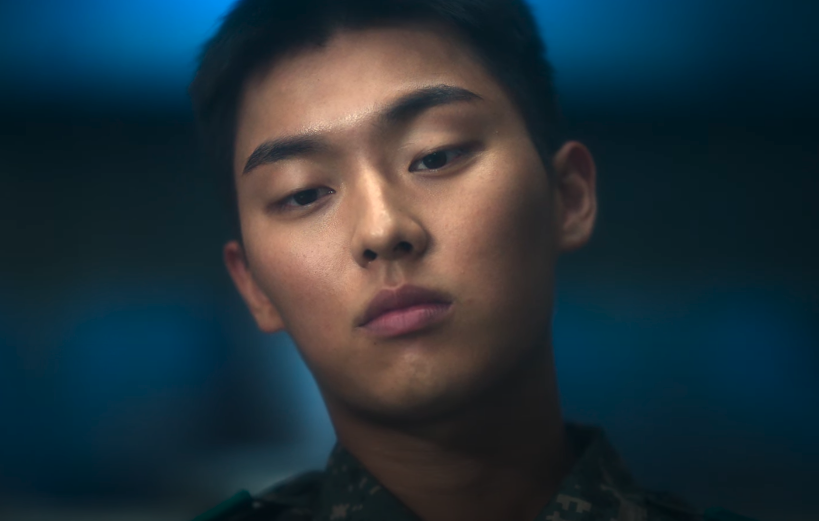There’s a scene in D.P. Season 2 that the show deliberately refuses to show you. And that choice—that deliberate absence—might be the most honest thing about Episode 4.
I need to tell you about a memory first.
Chestnuts and Soldiers
Foggy autumn morning. A dirt road winding up a mountain near the ceasefire line. I was maybe ten or eleven, picking chestnuts with my grandmother, and her house was ridiculously close to North Korea—close enough that from the front yard, you could see the barbed wire fences slicing through the landscape like stitches holding two countries apart.
My grandparents ran a tiny convenience store right next to a military base, and the atmosphere there was always 쓸쓸하고 을씨년스러운—desolate and eerie. That’s the only way to describe it.
That morning, while I was bent over looking for chestnuts, I heard this rumble. A military truck, coming down that dirt road. In the back, soldiers in full combat gear, fully armed, loaded like cargo. And their faces—looking back now, they had such young faces. So impossibly young.
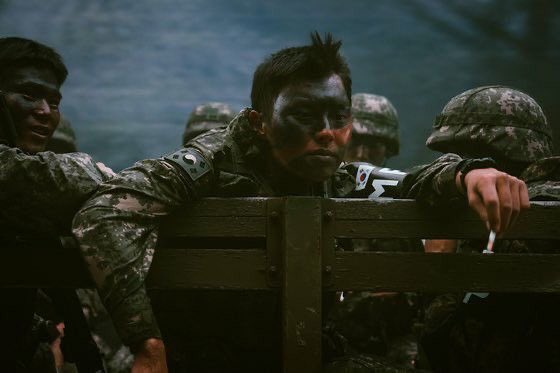
Years later, when I watched D.P. Season 2, Episode 4, I saw that truck again. And in it, Choi Hyun-wook’s Shin A-hwi—same truck, same young face, same feeling. It was like the episode had reached into my childhood and pulled it onto the screen.
That’s how real “The Charred Remains” (불고기괴담) felt to me.
The Baseball Player Who Became a Soldier
Before we go further, let me tell you about Choi Hyun-wook himself—because understanding the actor helps you understand why his A-hwi cuts so deep.
Hyun-wook was a baseball prospect. From fourth grade through his first year of high school—nearly ten years dedicated to the sport. He was apparently so good that his high school team was fielding scouting offers. At school, he was known simply as “baseball player Choi Hyun-wook.”
Then, at seventeen, an elbow injury ended it all.
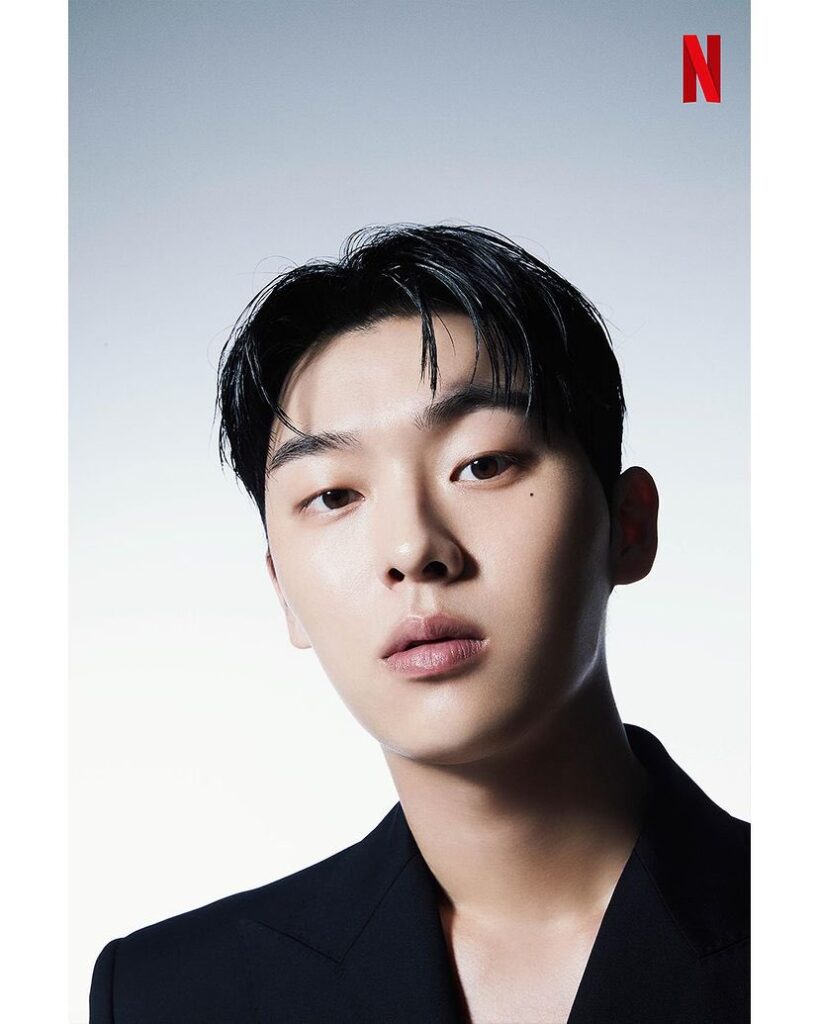
After pouring over a decade of his life into baseball, the recovery didn’t pan out. But instead of getting stuck in his feelings about an injury that wouldn’t heal, Hyun-wook quickly pivoted to Plan B. He talks about what he calls his “kkang”—this Korean slang that hits different from basic courage. Kkang carries this vibe of mental steel, unbreakable grit.
“As time goes on, I keep thinking—my sports background became such a huge asset for me,” he’s said in interviews.
And you can see it. Directors on every set tell him he’s got “good eyes”—sharp, alert eyes that just draw people in. Whether I’m watching Hyun-wook as the bright guardian angel Suho in Weak Hero or as the mysterious, damaged A-hwi in D.P., the first thing that grabs me are those razor-sharp, captivating eyes.
That’s where the kkang lives—forged through athletics, an experience that pushed him to the breaking point.
The Lighter
There’s this behind-the-scenes story from D.P. that I can’t stop thinking about.
In Episode 4, there’s a scene where Shin A-hwi smokes a cigarette—super quick, you could totally miss it. But Hyun-wook had this specific idea about how to make the smoking scene more stylish. The problem? He’s a newbie on this massive Netflix production. How do you pitch an idea to Director Han Jun-hee without looking like you’re overstepping?
So he did something clever.
He started playing with the lighter near the director—just like how A-hwi plays with it on that military truck, flicking it on and off, provocatively. Making it look natural. And Director Han caught on. He used Hyun-wook’s idea in the scene.
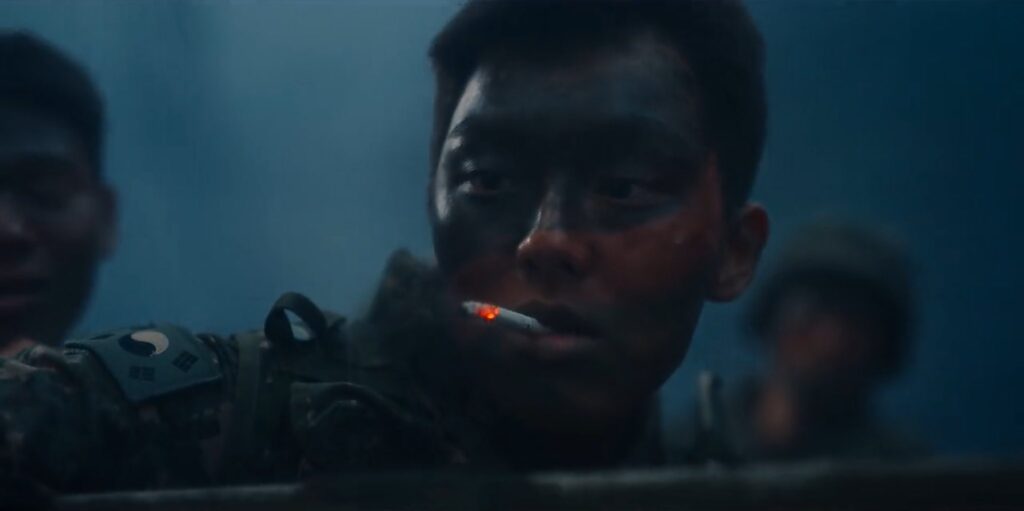
I love this story because it shows you what kind of actor Hyun-wook is. He thinks about the tiny details. Even how to light a cigarette. Even as a rookie, he had the kkang to quietly advocate for his character.
And then there’s the other story—after filming that insane confrontation scene between Son Seok-gu’s Ji-seop and Hyun-wook’s A-hwi on that isolated GP island, that super tense, sparks-flying moment. Son Seok-gu found Hyun-wook outside in the night air, looking relieved, and asked:
“Why are you so damn good at acting?”
He was asking how this young guy, barely into his early twenties, could act this instinctively good.
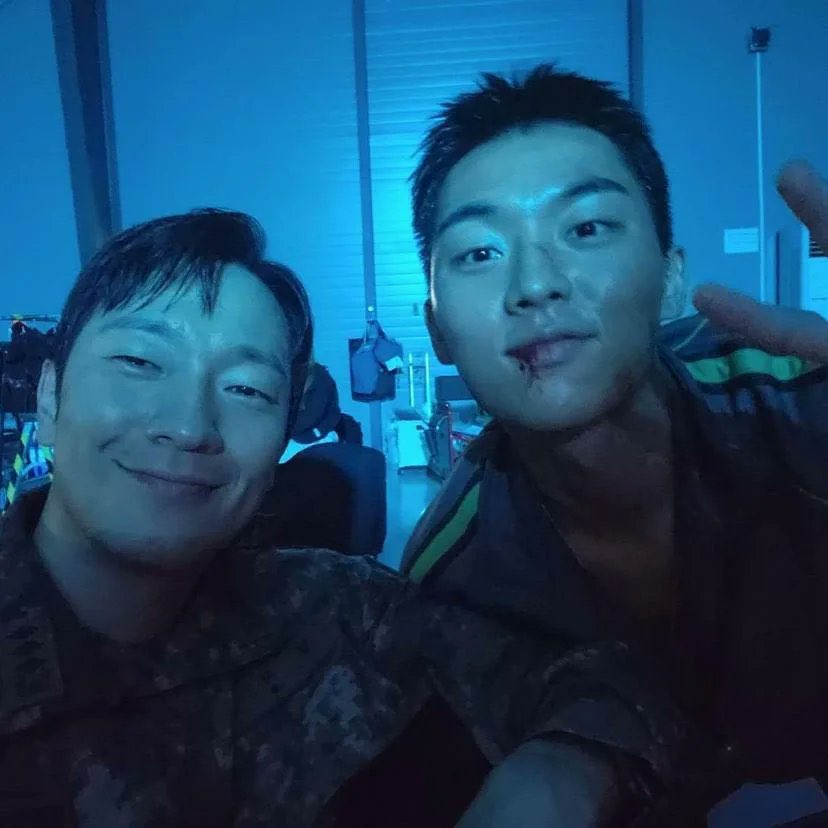
Reading about this made me grin. Because after I fell for Hyun-wook in Weak Hero, I went down this rabbit hole—watching all his interviews, going through his filmography piece by piece. And I got this strong feeling: this guy has instinct. Real instinct for acting.
But it’s not just talent. He works. At last June’s Muju Mountain Film Festival fan talk, Hyun-wook revealed that while most people think his improvisations just pop up out of nowhere on set, he actually preps them at home beforehand.
The grind is there. The kkang is there.
Bulgogi Goedam
Now, about that episode.
If you’re not Korean or didn’t serve in the Korean military, you’re probably wondering: what the hell is a “bulgogi ghost story”?
Bulgogi literally means Korean-style grilled meat. But in this context? Way darker.
“Bulgogi Goedam” (불고기괴담) is one of the most infamous Korean military urban legends. The story goes like this: decades ago, at a GP (guard post) near the ceasefire line, North Korean soldiers infiltrated in the middle of the night. Killed the South Korean soldiers. Set their bodies on fire. By the time anyone found them, the bodies were so badly burned they looked like charred meat.
Bulgogi. Charred meat.
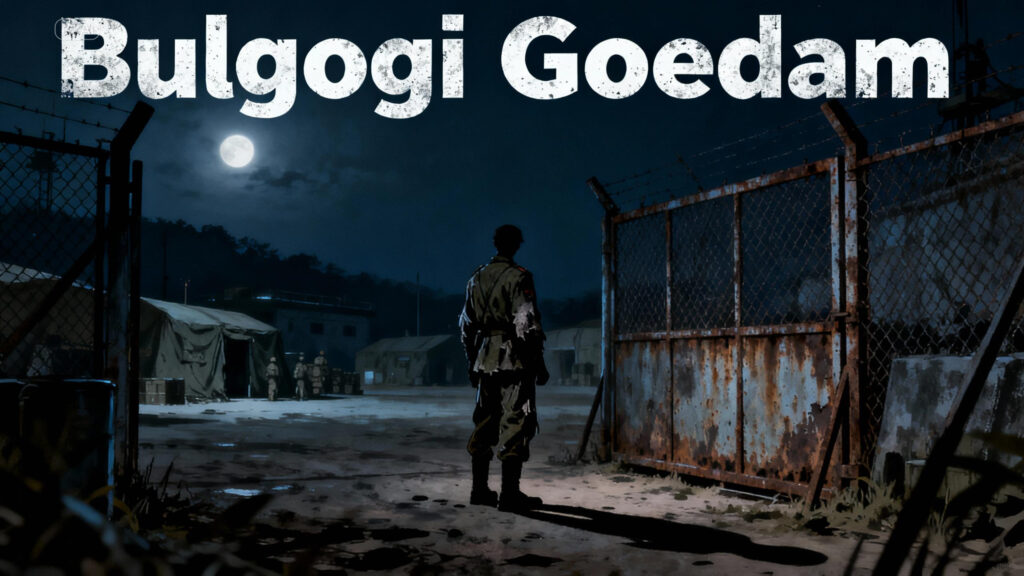
Now here’s the thing. Most Korean military horror stories? Soldiers tell them to scare each other. But “Bulgogi Goedam”? Officers tell this to their soldiers to emphasize night watch duty. “Stay alert. Don’t fall asleep. This really happened.” And some officers genuinely believe it.
Did it actually happen? Nobody knows.
But if you’re a soldier at a GP, there’s no way you wouldn’t know this story. And every night, standing guard in pitch-black darkness, staring at North Korea right across the wire—they think about it.
That’s what Episode 4 brings in. Director Han Jun-hee took this collective ghost story and made it into a psychological thriller.
Circumstances Are Different for Everyone
People keep asking about this episode: “Was it Na Joong-seok or Shin A-hwi? Who was the aggressor?”
And honestly? That’s not the point.
A-hwi himself tells us this. There’s this line I absolutely love:
“정황이라는 건 겪은 사람마다 다 다른 거야.”
“Circumstances—they’re different for everyone who experiences them.”
That line is everything.
Based on what fans figured out and what the episode hints at, here’s probably what happened: Na Joong-seok was bullying Shin A-hwi in an area with landmines. Joong-seok tried to assault A-hwi. A-hwi pushed him back. As Joong-seok got up, he stepped on a landmine.
Explosion. Fire. Death.
So A-hwi was the victim. The trauma from that day—watching someone burn alive right in front of him—that’s why he flinches at sounds. Why fire terrifies him. Every time he sees fire, he sees that scene again. His own personal “Bulgogi Goedam.”
And here’s the tragic part: Shin A-hwi, who was the victim, has transformed to become like Sergeant Na Joong-seok due to that day’s trauma.
Remember what A-hwi says to Ji-seop when Ji-seop’s beating him?
“GP 온지 얼마 안됐는데 벌써 변하셨네요.”
“You haven’t been at the GP long, but you’ve already changed.”
With this sneer, right?
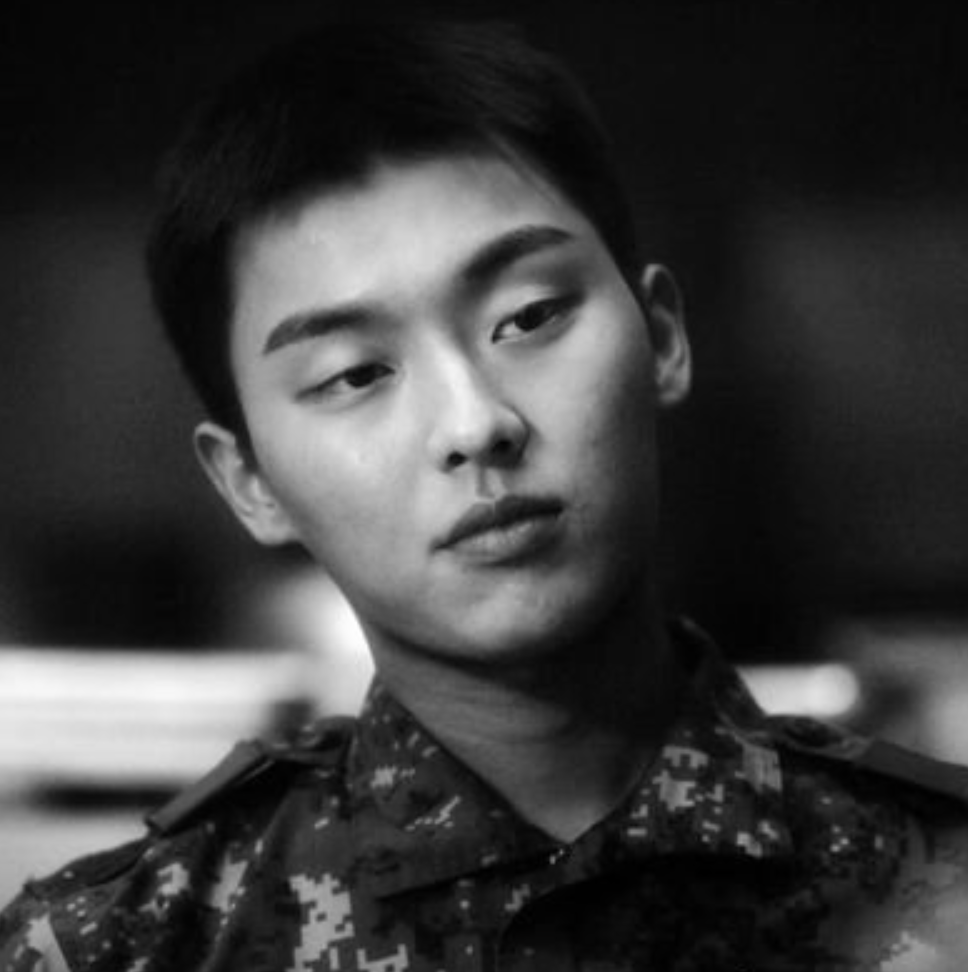
That line destroys me because A-hwi’s speaking from experience. He knows. Because he changed too. The victim became like the abuser.
But here’s the question: Is even this the truth?
The Scene You’ll Never See
In Episode 5, Jun-ho steals a USB with all the covered-up truths. We watch him go through the files, uncovering incident after incident. The camera shows us everything.
But when he gets to the A-hwi and Joong-seok incident—the camera deliberately zooms in on Jun-ho’s face. Shocked, eyes wide, confused.
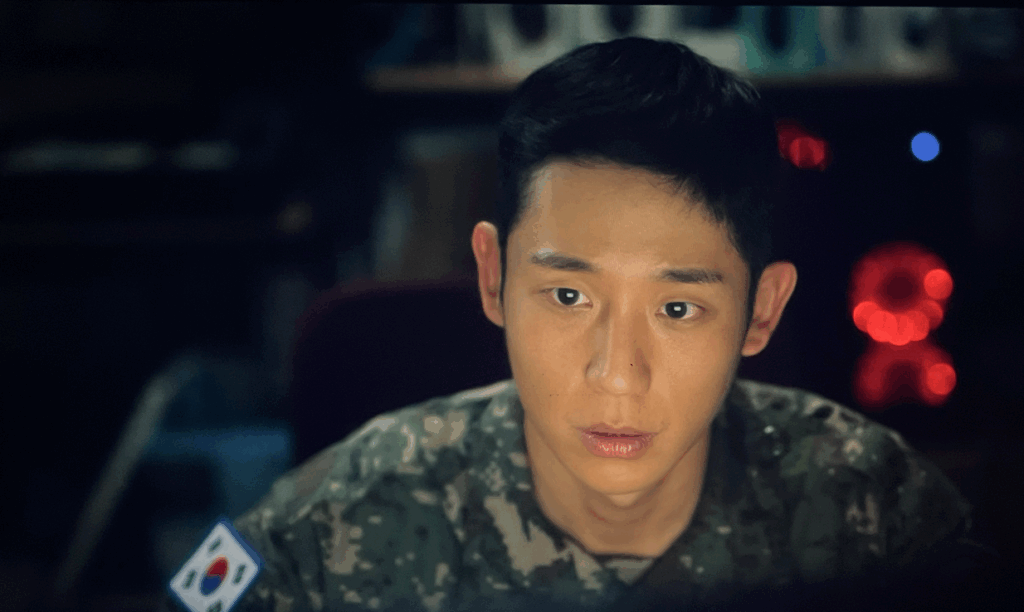
The screen never shows us what’s on that USB.
Why?
Because this drama says: “I’m not gonna tell you the truth. Because in that space, what ‘truth’ even is becomes ambiguous.”
This is where their style really shows. They don’t clearly separate aggressor and victim. Anyone within the system repeatedly becomes an aggressor, becomes a victim, and the victim becomes an aggressor.
Look at Ji-seop—he comes to the GP and within such a short time, he’s swept up in violence. The distinction between friend and foe becomes blurred.
정황이라는 건 겪은 사람마다 다 다른 거야.
Confirmation Bias and Islands
Before we talk about why people say Season 2 is “unrealistic,” I need to tell you something that hit me while watching.
The way Ji-seop climbs up to that GP with Jun-ho—Ji-seop’s already made up his mind before he even gets there. Confirmation bias. “A guy like Shin A-hwi must have attacked Sergeant Na Joong-seok.”
He’s decided. He goes up there with his judgment already clouded, standing on the line between reality and unreality.
And you know what this made me think of? Shutter Island. That masterpiece by Martin Scorsese.
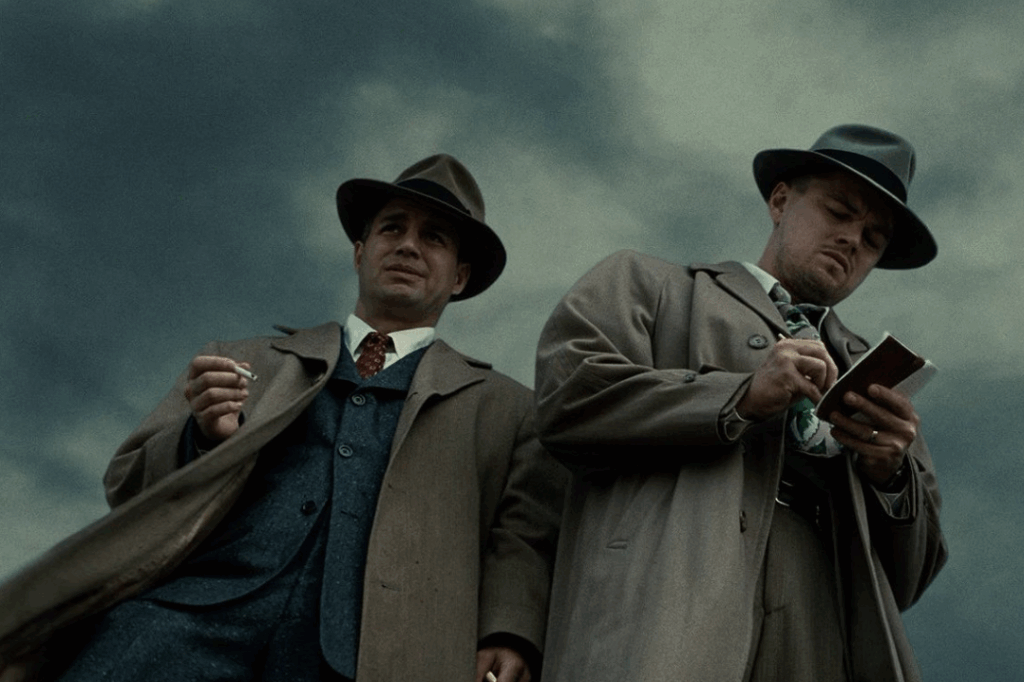
In Shutter Island, Teddy Daniels arrives at this isolated psychiatric facility on an island. From the start, he’s got confirmation bias. He’s convinced they’re doing unethical experiments. He sees what he wants to see.
The arrival at that remote island, the tension building—it felt similar to Ji-seop and Jun-ho going up to that GP. The guy entering an isolated space with assumptions already in place. Reality getting unreliable.
Watching Ji-seop climb that mountain, already convinced a certain low-ranking soldier is guilty—same eerie feeling.
And what’s brilliant is: they’re showing us Ji-seop’s mind already at the edge. Capturing the abyss of Lieutenant Lim Ji-seop, already leaning toward confirmation bias on the boundary between reality and unreality.
And Jun-ho? Watch Jun-ho climbing up with Ji-seop. He’s filled with depression. Hazy eyes. His mind slowly withering within the system.
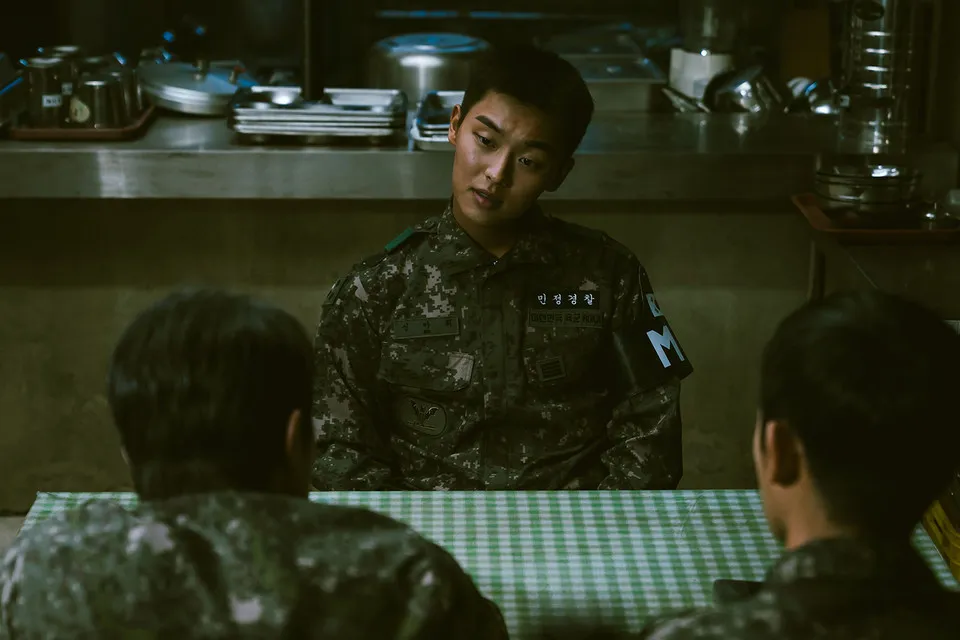
Then we see them. The hallucinations. His mother being beaten. The private he couldn’t save. Han Ho-yeol’s ghost.
If you look at it this way, you could say the fantasy-like direction stands out.
On Realism and Metaphor
If you go on Korean forums, you’ll see some complaints.
“Season 2 is too unrealistic.”
“GP portrayal is exaggerated.”
“Regular soldiers throwing cigarette butts at an officer’s car?”
“Jun-ho fighting almost ten people? Come on, that’s fantasy.”
And you know what? They’re not wrong about the facts. These things wouldn’t happen in a normal unit.
But I think people are missing the point.
Director Han said something important: “If we’re just repeating Season 1, there’s no point in making Season 2.”
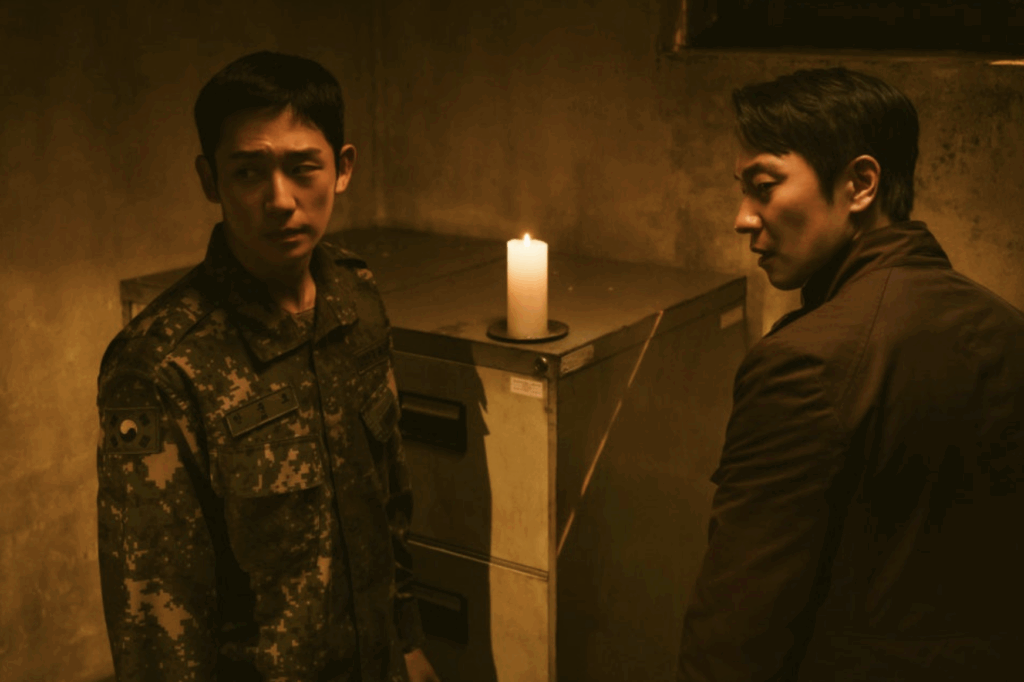
Season 1 was realistic. Documentary-like. Raw. Season 2 does something different. It uses metaphor. Visualization. Yeah, exaggeration—but not to be unrealistic. To show us something realism alone can’t capture.
Jun-ho’s hallucinations? They’re not trying to show you medical symptoms. It’s not literal. It’s visualization—showing what’s happening inside Jun-ho’s mind as the system breaks him. The hallucinations are metaphors.
The GP—as Lieutenant Lim Ji-seop said, “their own league”? In that isolated GP, normal rules broke down. In that space, reality itself warped. Is it realistic? No. But it’s showing us what happens when a system completely fails.
If they showed a “realistic” GP, we wouldn’t feel the collapse. The exaggeration is the point.
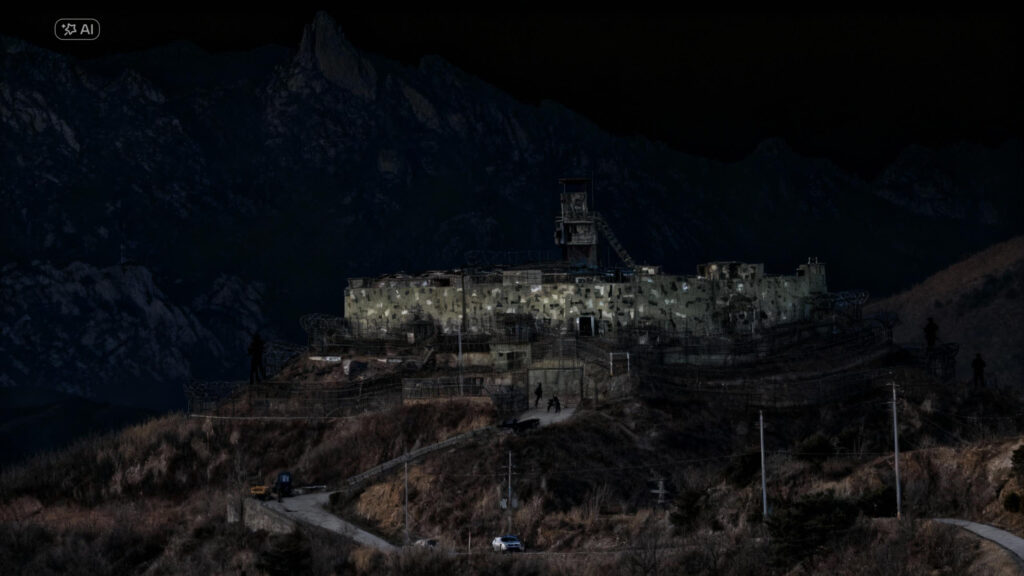
And that train fight in Episode 5—Jun-ho fighting almost ten people. People complain: “Impossible.” And they’re right.
But that’s exactly the point.
Throughout the series, Jun-ho keeps hearing: “What can you even do?” Individual versus the state. Individual versus the system.
That train fight? That’s his answer. It’s 바위로 계단치기—hitting stairs with a rock. You know it won’t work. Like Sisyphus pushing that boulder. The will to try something—anything. Nevertheless.
Can he realistically fight ten people? No.
But that’s what they’re showing—the absurdity. The absurdity of one person against an entire system. If it looked realistic, we wouldn’t feel the absurdity. But because it looks impossible—because it is impossible—we feel the weight of what they’re trying to say.
Season 2 isn’t trying to be Season 1. It’s using heightened reality—metaphor, visualization, exaggeration—not to escape reality, but to show us something about reality that straight realism can’t.
Another Memory
Remember my grandmother’s house?
One more thing about that place.
Every holiday, after eating way too much, I’d go outside. Sit on this little hill where you could see the barbed wire. Just to get some air.
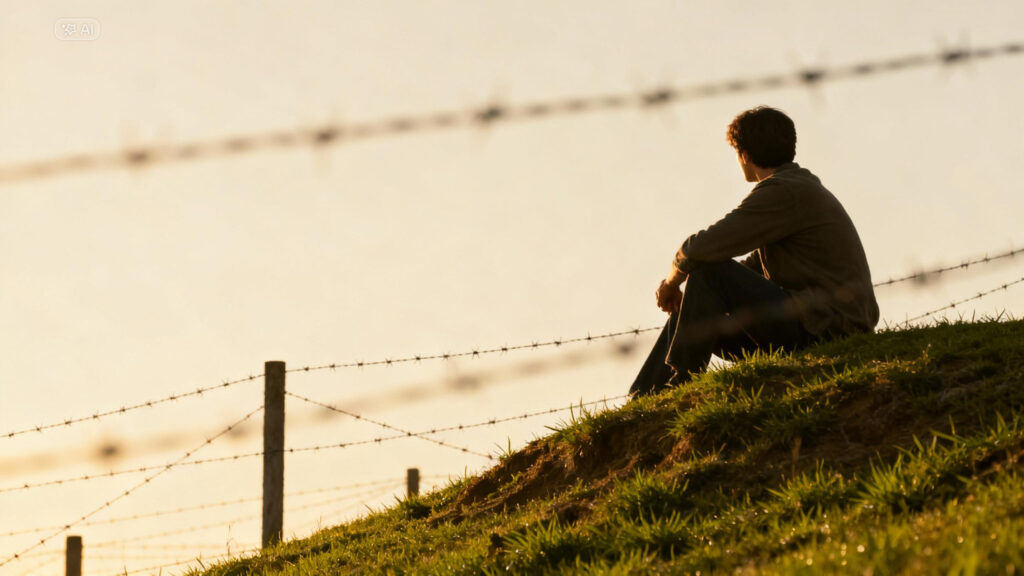
And then I’d hear it. 대남방송—North Korea’s propaganda broadcast. Blaring continuously. Echoing across the river-like sea.
Even as a kid, just a few minutes of that made my stomach turn. Something about that sound—distorted voices, endless repetition—created this feeling of unease.
And I only heard it for a few minutes during holidays.
But imagine: you’re at a GP where that plays all day. Every day. For months. Isolated space. The tension of not knowing when infiltration might happen. And they tell you: the Bulgogi ghost story.
Every night on guard, you remember that story. Is it real? Fake? You don’t know.
That’s what D.P. shows us. Not condemning it. Just observing. What does that do to a young mind? A mind slowly withering within the system.
Systems
You know what I keep thinking about?
Director Han Jun-hee’s consistent focus on systems.
D.P.—the military system. And that’s exactly what Director Han described as the “seasonal transition” that originally inspired him: the strangeness of a country handing a gun to a kid who’s barely figured out how to be an adult and telling him to protect the nation.
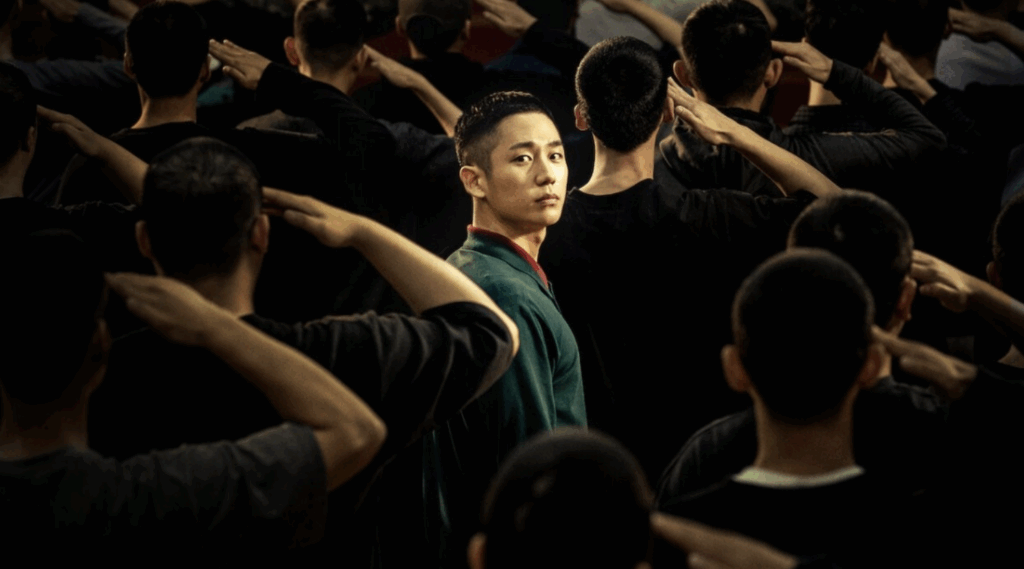
Weak Hero—the school system. Layered plotlines. Confined social spaces. Institutional violence and systematic injustice.
That’s his signature.
And honestly? I think the last system he’ll tackle is family. He’s already touched on it in Weak Hero—Si-eun’s parents, the neglected kids. But I think he’ll go deeper. Because family is the original system, right? The first place where power imbalances exist.
Military → School → Society (Work Place) → Family.
That’s the pattern I see.
On Young Actors and Kkang
At the center of “The Charred Remains” is Choi Hyun-wook’s Shin A-hwi. This young actor who thinks about every tiny detail—even how to light a cigarette. Who earned Son Seok-gu’s question: “Why are you so damn good at acting?”
From Suho’s brightness to A-hwi’s darkness—his range is something to watch.
Reading through his interviews, I learned something that stuck with me. Even this kkang-powered Hyun-wook had second thoughts when he first landed the Suho role in Weak Hero. He wasn’t sure he could pull off someone as cool as Suho—he honestly didn’t even want to touch it at first.
From what I gathered from various interviews, Hyun-wook actually burned massive energy on set, came home, and broke down sometimes. “Am I doing this right? Am I nailing this?” Even though he kept working hard, when he was alone, the doubts would come back.
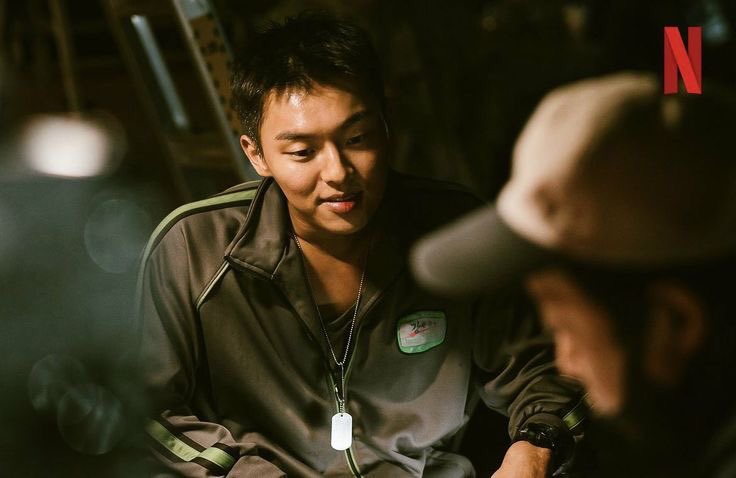
But check out the results. Who else could’ve nailed Suho if not Hyun-wook? I’m drawing a blank.
There’s this behind-the-scenes story from that emotionally wrecking Episode 7 of Weak Hero Class 1—the one where Suho goes back to MMA fighting in that gym boxing ring. From what I’ve researched, they had to complete this entire sequence in one day. After Hyun-wook threw his body around for over ten hours, he was completely wiped and dehydrated. When Director Yoo yelled “cut,” Hyun-wook just crashed spread-eagle on the ring.
The director was about to suggest taking a break, but Hyun-wook suddenly popped up, chugged water, and said he could go more rounds—let’s keep rolling.
Reading about Director Yoo’s reaction to this moment and the emotions he felt, I could almost picture that same rush that moved him to tears. That fire from the director and actors gets beamed straight to viewers, and I feel Hyun-wook’s drive and kkang every time I catch that scene.
When Weak Hero Class 1 was getting made, it involved a rookie director and mostly rookie actors, so nobody saw this work’s success coming. But as Hyun-wook shared, during filming, he was so passionate about this work and the Suho character that even if the ratings completely failed, he was determined to give his absolute best.
Reading not just about Weak Hero but all of Hyun-wook’s interviews one by one, I found myself asking: when was the last time I tackled something with that young spirit of “failure doesn’t matter, I just wanna give my best shot”?
Nobody expected it to blow up. But rookie director and rookie actors came together to create something compelling with pure passion—and that experience definitely left lasting impact.
Final Thoughts
So here we are. D.P. Season 2, “The Charred Remains.” A Korean military legend turned into a psychological thriller. And at its center, a young actor with baseball-forged kkang, performing a character who watched someone burn alive and became what he feared most.
When people say Season 2 is “too unrealistic,” I think of A-hwi’s line:
정황이라는 건 겪은 사람마다 다 다른 거야.
Circumstances are different for everyone who experiences them.
Sometimes reality is so absurd that only metaphor can capture it. Sometimes the most honest thing a story can do is refuse to show you the truth—because in that space, on that isolated island, in that GP where propaganda broadcasts echo across the river-like sea and young soldiers stand guard thinking about ghost stories, what “truth” even is becomes ambiguous.
And sometimes the scene you’ll never see is the one that tells you everything.
⛔️ Copyright Disclaimer: All drama footage, images, and references belong to their respective copyright holders including streaming platforms and original creators. Materials are used minimally for educational criticism and analysis with no intention of copyright infringement.
🚫 Privacy Policy: This site follows standard web policies and does not collect personal information beyond basic analytics for content improvement. We use cookies to enhance user experience and may display advertisements.
